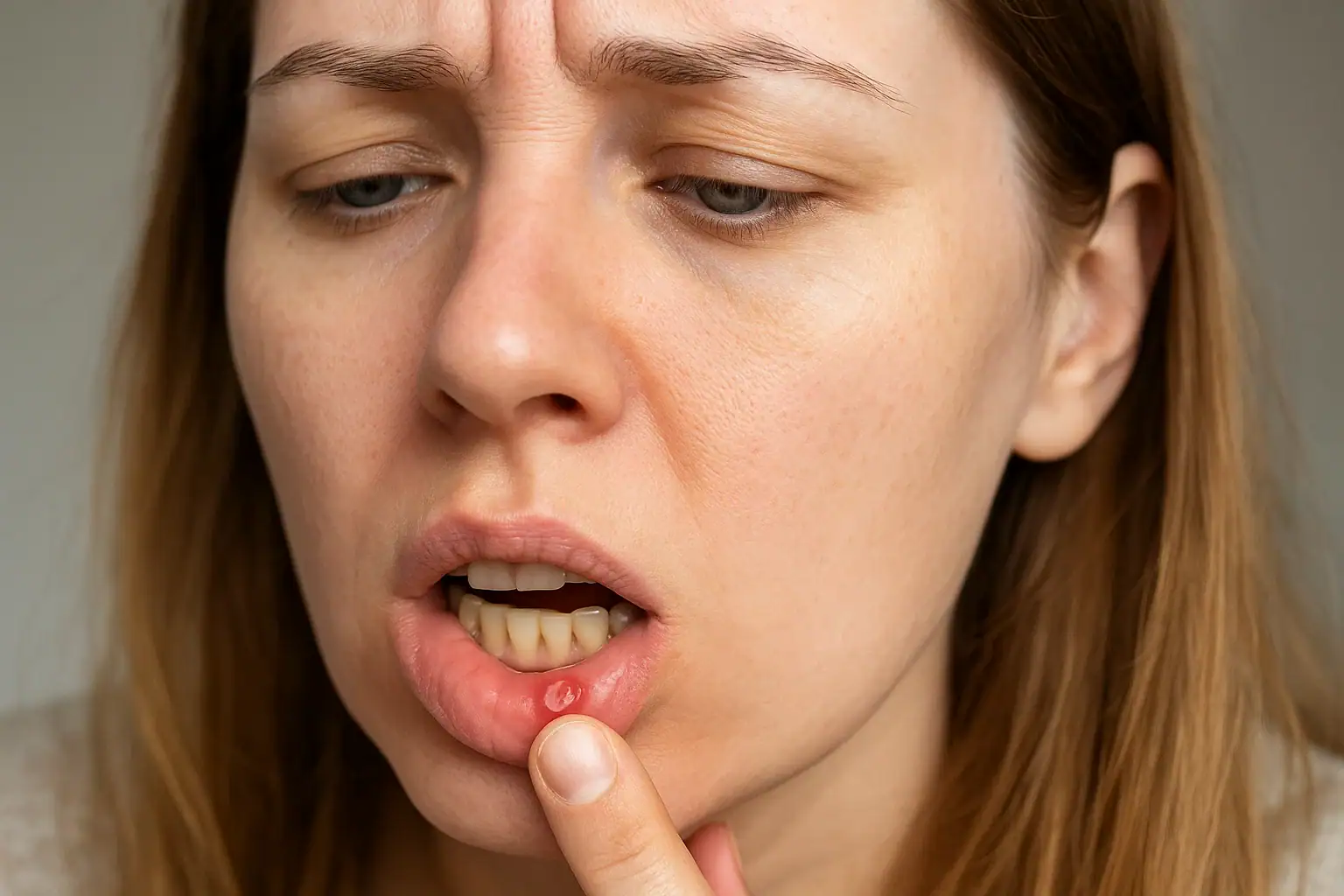Menu
Free Consultation

Canker sores are a common oral condition that many people experience at some point in their lives. While these small, painful ulcers can be bothersome, a common question arises: are canker sores contagious? In this comprehensive blog post, we will explore the causes, symptoms, treatment options, and—most importantly—the contagiousness of canker sores. We’ll also address questions like “are canker sores contagious by kissing?” and “are canker sores on the tongue contagious?” to give you a complete understanding.
Canker sores, also known as aphthous ulcers, are small, round or oval lesions that develop inside the mouth. They often appear on the:
These ulcers are usually white or yellow with a red border and can cause a burning or tingling sensation, especially when eating spicy or acidic foods.
No, canker sores and cold sores are not the same.
| Feature | Canker Sores | Cold Sores |
|---|---|---|
| Location | Inside the mouth | Outside the mouth (usually lips) |
| Cause | Non-viral (immune-related, stress) | Herpes simplex virus (HSV-1) |
| Contagious | ❌ Not contagious | ✅ Highly contagious |
| Appearance | Ulcers with white/yellow centers | Blisters filled with fluid |
This distinction is crucial when asking, "Are canker sores contagious?"
The short answer is no. Canker sores are not contagious. Unlike cold sores, they are not caused by a virus and cannot be passed from one person to another through kissing, sharing utensils, or close contact.
Some people worry more when sores appear in different parts of the mouth, such as the tongue. But even then, canker sores on the tongue are not contagious. They are a localized immune response and not caused by a transmissible agent.
This is a commonly searched question: "Are canker sores contagious by kissing?"
The answer remains no. Even though kissing involves close contact and exchange of saliva, canker sores are not infectious. There is no need to worry about passing them to your partner.
Common Misconception: Many people confuse canker sores with cold sores, which are caused by the herpes simplex virus and are contagious through kissing.
Canker sores have several potential triggers, although the exact cause is often unknown. Common factors include:
Stress is a well-documented trigger for canker sores. While stress itself isn’t contagious, it can lead to immune system changes that make the body more vulnerable to developing ulcers. Chronic stress may also delay healing once a sore has formed.
Helpful Tip: Practice relaxation techniques like meditation, deep breathing, and adequate sleep to reduce stress-induced outbreaks.
Canker sores can affect people of all ages, including children. Parents often worry: are canker sores contagious in children? Rest assured, they are not. However, young children may have more frequent occurrences due to dietary factors, injuries from rough brushing, or stress related to school or social interactions.
Parenting Tip: Teach your child gentle brushing techniques and encourage a balanced diet rich in iron and B vitamins.
While most canker sores heal on their own within 7 to 14 days, there are situations where medical advice is needed:
In rare cases, persistent or severe sores could indicate an underlying condition such as:
For severe cases, doctors may recommend:
While you may not always be able to prevent them, here are a few strategies to reduce the risk:
Let’s answer this clearly and directly: No, canker sores are not contagious if you kiss someone.
Kissing does not transmit canker sores. These sores are caused by internal factors like immune response or stress, not viruses or bacteria. You can kiss without worry—just be cautious if kissing causes discomfort due to the sore itself.
No, a single canker sore does not spread to other areas like a virus. However, multiple sores can appear at once, especially if the trigger (e.g., stress, acidic food) affects several regions of the mouth at the same time. This leads some people to mistakenly believe the sore has "spread," when in fact, they are multiple individual ulcers forming simultaneously.
Yes, genetics can play a role. If a close family member—like a parent or sibling—suffers from recurrent canker sores, you're more likely to experience them too. This doesn’t make them contagious; it simply means your immune system may be more prone to triggering an inflammatory response in the oral tissues.
Lack of essential nutrients is a hidden trigger for recurrent canker sores. Key nutrients involved:
If you're experiencing frequent sores, your doctor may recommend a blood test to check for deficiencies. Supplementation can significantly reduce outbreaks.
| Healing Stage | Timeline | Description |
| Onset | Day 1 | Tingling or burning sensation |
| Sore Appears | Days 2–3 | Ulcer forms; pain increases |
| Peak Pain | Days 4–5 | Most discomfort when eating/talking |
| Healing Begins | Days 6–10 | Ulcer starts shrinking |
| Full Recovery | Days 11–14 | Tissue regenerates completely |
While occasional canker sores are harmless, frequent or severe outbreaks could be linked to underlying autoimmune diseases such as:
If you're dealing with more than 3–4 episodes per year, it may be worth getting evaluated by a healthcare provider.
New research is exploring how an imbalance in the oral microbiome—the community of bacteria in your mouth—might contribute to the development of canker sores. While the science is still evolving, maintaining a healthy oral environment with good hygiene and probiotic-rich foods could offer protective benefits.
Consult a healthcare provider if:
No, canker sores are not contagious.
The correct grammar would be “are canker sores contagious?” Either way, the answer is still no.
No, canker sores on the tongue are also not contagious.
No, you cannot catch or transmit canker sores through kissing.
Still no—they are not spread through kissing or any oral contact.
So, are canker sores contagious? The answer is a confident no. Understanding the difference between canker sores and cold sores can ease a lot of unnecessary worry. While canker sores can be painful and annoying, they pose no risk to those around you. By managing stress, eating a balanced diet, and practicing good oral hygiene, you can reduce the frequency and severity of outbreaks.
For persistent issues, don’t hesitate to speak with a dental or medical professional.
